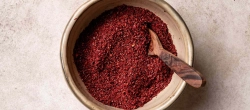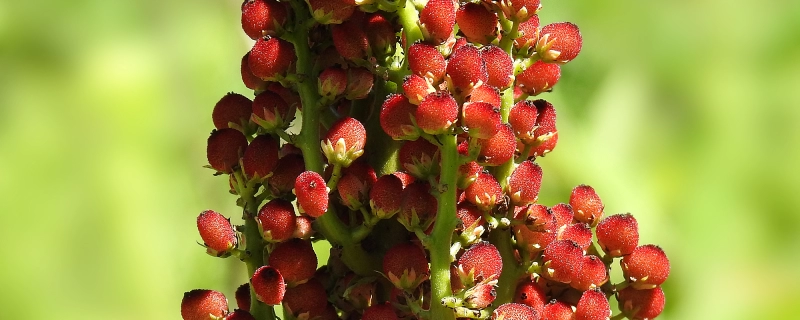Category: Herbs and Spices
Sumac: Taste, Uses, and Benefits
Sumac is a spice made from the dried and ground berries of the Rhus shrub, which has a tangy, slightly fruity taste. Originally from the Mediterranean and Middle Eastern regions, sumac has long been used in cooking to add a fresh acidity and mild tartness to dishes.
What does Sumac taste like?
Sumac has a distinctive, tangy flavor reminiscent of lemon or vinegar, though less sharp. It adds a refreshing sourness and mild astringency to foods, making it a popular substitute for lemon juice or vinegar in recipes that need a gentle but noticeable acidic taste.
Flavor and Texture Details
- Flavor: Tart, citrusy, with fruity and slightly floral notes.
- Aroma: Light, slightly sweet, with an earthy, lemony scent.
- Texture: Fine, powdery, with a slight graininess that dissolves well in dishes.

How Can Sumac Be Used in Cooking?
Sumac is a versatile spice that can be sprinkled over dishes as a finishing touch or incorporated into dressings and marinades. Here are some common culinary uses:
- Seasoning for Meats: Often used to add depth to lamb, chicken, or beef dishes by enhancing their natural flavors.
- In Salads: Sumac adds brightness to salads, especially those with tomatoes, cucumbers, and onions, like the Middle Eastern Fattoush salad.
- Dips and Sauces: Sumac is a popular ingredient in dips like hummus and baba ganoush, providing a hint of tartness.
- Marinades and Spice Blends: It’s a key ingredient in spice blends like za'atar, adding a complex citrusy flavor that complements other herbs.
What Are the Health Benefits of Sumac?
Sumac is not only flavorful but also has several health benefits due to its rich antioxidant content and other properties:
- High in Antioxidants: Sumac contains antioxidants that can help reduce inflammation and protect cells from damage.
- Supports Digestion: Known to improve digestive health by easing bloating and enhancing gut function.
- Anti-inflammatory Properties: Sumac may reduce inflammation, which is beneficial for overall health and can support the immune system.
- Blood Sugar Control: Some studies suggest sumac may help regulate blood sugar levels, though more research is needed.
Are There Any Precautions When Using Sumac?
While sumac is generally safe, here are a few things to keep in mind:
- Potential Allergies: Although rare, some individuals might have sensitivities to plants in the Rhus family.
- Use in Moderation: Due to its strong flavor, it’s best to use sumac in small amounts to avoid overpowering the dish.

How to Choose and Store Sumac?
For the best flavor, it’s important to choose and store sumac properly:
- Color and Freshness: High-quality sumac should have a vibrant reddish-purple color. Fresh sumac will also have a strong, pleasant lemony scent.
- Storage: Store sumac in an airtight container in a cool, dry place away from direct sunlight to maintain its potency and flavor for up to a year.
Fun Facts About Sumac
- Historical Use: Sumac has been used since ancient times in Middle Eastern cuisine and as a traditional remedy for various ailments.
- Lemon Substitute: Due to its natural sourness, sumac is often used as a lemon alternative in dry spice form, especially in regions where lemons are less available.
- In Drinks: Historically, sumac berries were steeped in water to make a refreshing, lemonade-like drink.